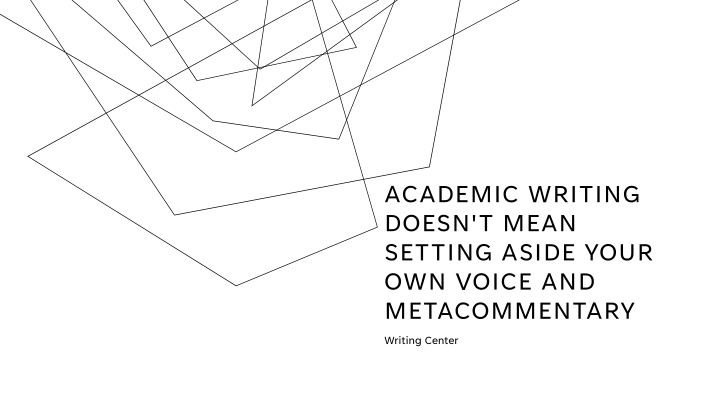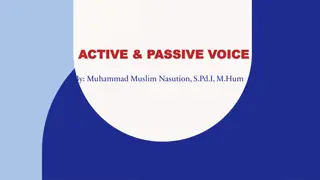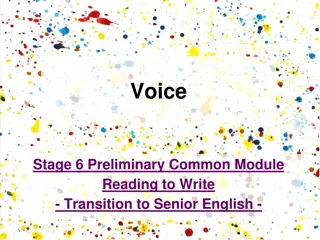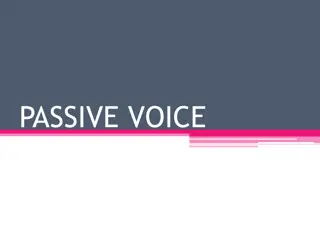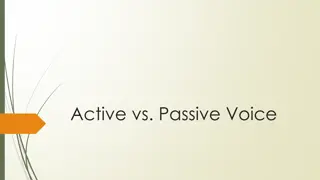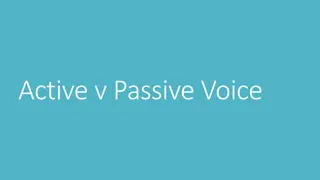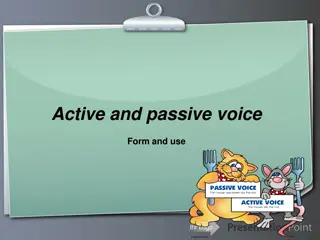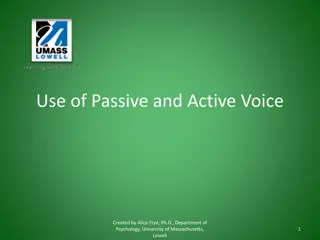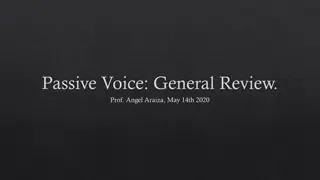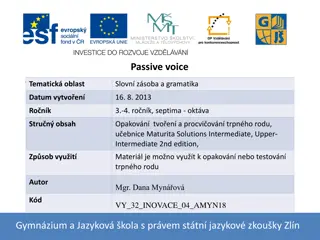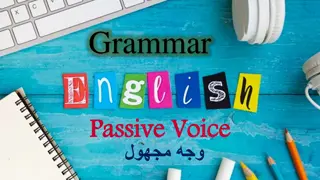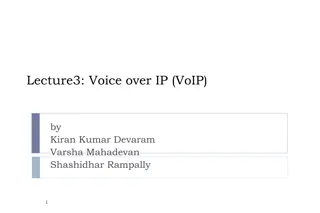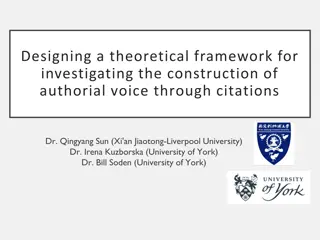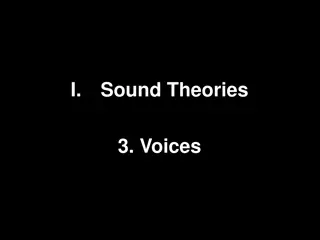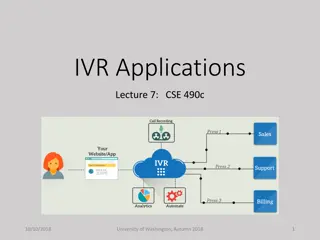Embracing Your Voice in Academic Writing
Academic writing doesn't require you to abandon your unique voice. It's about finding a balance between everyday language and academic tone. Avoiding convoluted writing is key to engaging readers. Blending colloquial and academic styles can enhance clarity and audience understanding, making complex topics more accessible. Remember, academic writing doesn't have to be dull - embrace your voice and style to create engaging and effective content.
Download Presentation

Please find below an Image/Link to download the presentation.
The content on the website is provided AS IS for your information and personal use only. It may not be sold, licensed, or shared on other websites without obtaining consent from the author.If you encounter any issues during the download, it is possible that the publisher has removed the file from their server.
You are allowed to download the files provided on this website for personal or commercial use, subject to the condition that they are used lawfully. All files are the property of their respective owners.
The content on the website is provided AS IS for your information and personal use only. It may not be sold, licensed, or shared on other websites without obtaining consent from the author.
E N D
Presentation Transcript
ACADEMIC WRITING DOESN'T MEAN SETTING ASIDE YOUR OWN VOICE AND METACOMMENTARY Writing Center
BUT ISN'T GOOD WRITING CONVOLUTED? Academic writing doesn't mean "setting aside" your own voice. "...mastering academic writing does not mean completely abandoning your normal voice for one that s stiff, convoluted, or pompous, as students often assume. Instead, it means creating a new voice that draws on the voice you already have" (They Say/ I Say 118). This does NOT mean that you should: Use any language that you use with friends. Use this as an excuse to fall into your "comfort zone." Or to avoid learning new words and forms. Academic writing is at its best when it combines "everydayspeak" with "academicspeak." Pitch Deck 2
IRONICALLY, THIS WAS TAKEN FROM AN ARTICLE ABOUT IMPROVING ACADEMIC WRITING.... "Rarely is there an effective conceptual link between the current understandings of the centrality of text to knowledge production and student learning and the pragmatic problems of policy imperatives in the name of efficiency and capacity." Writing like this makes people not want to learn and has unnecessary jargon! Pitch Deck 3
ACADEMIC WRITING DOESN'T HAVE TO BE DULL Patricia Nelson Limerick: "I do not believe that professors enforce a standard of dull writing on graduate students in order to be cruel. They demand dreariness because they think that dreariness is in the students best interests. Professors believe that a dull writing style is an academic survival skill because they think that is what editors want, both editors of academic journals and editors of university presses. What we have here is a chain of misinformation and misunderstanding, where everyone thinks that the other guy is the one who demands dull, impersonal prose" (qtd. In Sword). Pitch Deck 4
BLEND ACADEMIC AND COLLOQUIAL STYLES There are numerous benefits to blending colloquial (everyday speak)and academic styles. For instance, It can often make complicated topics easier for your reader to digest. It is often great when trying to discover what you want to say. It helps to remind us of our audience. What do they know? What don't they know? Self-translation: The process of clarifying your own complex ideas. Example: We can hardly get through our lives in fact, it s hard to get through a week without considering what makes specific actions right and others wrong and debating with ourselves whether that is a difference that must compel the actions we choose. (Okay, it s wrong! I get it! But why should I care?). -Rebecca Goldstein, Plato at the Googleplex: Why Philosophy Won t Go Away Pitch Deck 5
BLENDING STYLES TRANSLATING ACADEMIC SPEAK ALTERNATIVELY.. Scholar X argues, ____ . In other words,______ . Instead of In other words, you might try variations like the following: Essentially, X argues . X s point, succinctly put, is that . Plainly put, .t Pitch Deck 6
AN EXCERPT FROM MY OWN WRITING An Exploration into Cultural Death Studies of the Cold War and The Twilight Zone S. Warren Space races, wars, nuclear bombs, mass consumerism, and the flexing of industrial might, is what many would attribute to the vastly dynamic culture of the 1950s-1960s United States. Emphasis on technological advancement peppered with a growing ideological push towards an idyllic American society permeated the media outlets of radio, newspapers, and the increasingly popular television set. For the first time, television was becoming the focal point of American homes by bringing in news coverage alongside entertainment through countless sitcoms and anthology dramas that spanned various genres of romance, science-fiction, action, westerns, etc. While television critics of the 1960s, such as Richard Burgheim, lamented that television was merely a clunky household appliance that spewed corporate agendas and dictated by uncultured masses, these critics did little to hamper the popularity of television (Newman & Levine 14). In fact, television became widely acknowledged as a culturally significant object that allowed for one to participate in the lived experience of the collective in a domestic space (3). Although its extensive success, critics like Richard Burgheim, should not be entirely written off regarding their assessment of the corporate agendas of networks and organizations See how this person introduces Richard Burgheim using a blend of academic and everyday speak? Pitch Deck 7
THERE IS NO SUCH THING AS BAD ENGLISH PBS- What People Get Wrong About African- American English Many people have often heard that those that speak/use anything outside of Standard American English are using Bad or Incorrect English. However, this is simply NOT true. There are many different types of Englishes that exist across the globe. Each version of English, whether it be Black English or any other type of English, is valid as they all use specific forms of grammar, language use, and stem from various rich cultural heritages. It is not that any English is bad , it is more so that English speakers need to realize when to code-switch or use a particular type of English in specific contexts. Pitch Deck 8
BLENDING STYLES "In Black America, the oral tradition has served as a fundamental vehicle for gittin ovah. That tradition preserves the Afro-American heritage and reflects the collective spirit of the race. Blacks are quick to ridicule educated fools, people who done gone to school and read all dem books and still don t know nothin! It is a socially approved verbal strategy for black rappers to talk about how bad they is. Geneva Smitherman, Talkin and Testifyin: The Language of Black America." -Geneva Smitherman, Talkin and Testifyin: The Language of Black America Where in these examples does Geneva Smitherman blend styles? Pitch Deck 9
BLENDING STYLES Similar writers like activist Gloria Anzald a mixes standard English (SAE) with what she calls Chicano Spanish. The way she blends her language helps her to better elaborate on her points about the suppression of the Spanish language in the United States. If she were to only use Standard American English, it would contradict the message that she was trying to spread. For instance: "From this racial, ideological, cultural, and biological crosspollinization, an alien consciousness is presently in the making a new mestiza consciousness, una conciencia de mujer." -Gloria Anzald a, Borderlands / La Frontera: The New Mestiza How does blending styles make Gloria Anzald a's message MORE powerful? Pitch Deck 10
METACOMMENTARY Metacommentary: Adding further explanation to your ideas. Metacommentary is not adding new ideas but telling your audience how to think about your claims/ideas. For example: What I meant to say was_____ , My point was not ____, but ____ , or You re probably not going to like what I m about to say, but ______. Think of your paper as two texts. 1) Where you are making your argument. from what others say and anticipating questions. 2) Where you are also distinguishing what you say Two reasons to use metacommentary: might not. 1) Even if YOU think your writing is clear, others have a hard time making page requirements. 2) It fleshes your ideas out! Great for people that Pitch Deck 11
CAN YOU SPOT THE METACOMMENTARY? It is my intention in this book to show that a great . . . shift has taken place in America, with the result that the content of much of our public discourse has become dangerous nonsense. With this in view, my task in the chapters ahead is straightforward. I must, first, demonstrate how, under the governance of the printing press, discourse in America was different from what it is now generally coherent, serious and rational; and then how, under the governance of television, it has become shriveled and absurd. But to avoid the possibility that my analysis will be interpreted as standard-brand academic whimpering, a kind of elitist complaint against junk on television, I must first explain that . . . I appreciate junk as much as the next fellow, and I know full well that the printing press has generated enough of it to fill the Grand Canyon to overflowing. Television is not old enough to have matched printing s output of junk. Pitch Deck 12
AN EXAMPLE OF METACOMMENTARY It is my intention in this book to show that a great . . . shift has taken place in America, with the result that the content of much of our public discourse has become dangerous nonsense. With this in view, my task in the chapters ahead is straightforward. I must, first, demonstrate how, under the governance of the printing press, discourse in America was different from what it is now generally coherent, serious and rational; and then how, under the governance of television, it has become shriveled and absurd. But to avoid the possibility that my analysis will be interpreted as standard-brand academic whimpering, a kind of elitist complaint against junk on television, I must first explain that . . . I appreciate junk as much as the next fellow, and I know full well that the printing press has generated enough of it to fill the Grand Canyon to overflowing. Television is not old enough to have matched printing s output of junk. Pitch Deck 13
TEMPLATES FOR METACOMMENTARY To ward off potential misunderstandings: Essentially, I am arguing not that we should give up the policy, but that we should monitor effects far more closely. This is not to say ____, but rather ___. X is concerned less with _____than with ______. To elaborate on a previous idea: In other words, ____. To put it another way, _____. What X is saying here is that _____. Pitch Deck 14
TEMPLATES FOR METACOMMENTARY To provide a road map to your text: Chapter 2 explores _____, while Chapter 3 examines ____. Having just argued that _____, I want now to complicate the point by ____. To move from a general claim to a specific example: For example, ____. for instance, ___ demonstrates _____. Consider ____, for example. To take a case in point, _______. Pitch Deck 15
TEMPLATES FOR METACOMMENTARY To indicate that a claim is more, less, or equally important: Even more important,____ . But above all, _____. Incidentally, we will briefly note, _____. Just as important, _____. Equally, _____. Finally, _________. Pitch Deck 16
TEMPLATES FOR METACOMMENTARY To explain a claim when you anticipate objections: Although some readers may object that _____, I would answer that _____. To guide readers to your most general point: In sum, then, _____. My conclusion, then, is that ____. In short, _____. Pitch Deck 17
GETTING WRITING DONE Eight strategies to "getting writing done" is: 1. Write daily: Giver yourself a personal goal of how much you want to write a day. Whether it is 3 pages or one paragraph, make writing a daily habit. 2. Make small goals and meet them: Small goals are achievable and help to avoid those feelings of being a "failure." Make small, realistic goals about your writing. 3. When you're stuck, keep writing: It is hard to write when you don't know what to write! Even if you don't "think" you can write, put something down. 4. Avoid virtuous procrastination: Don't fall into the trap of "I can't start writing until I know everything!" 5. Make fear an ally: address your fears! Don't run from them! Use fear as a learning tool and ask yourself, "Why am I afraid of this sentence/paragraph/ transition/etc.") 6. Start poor, finish rich: Not everything that is written down is "golden language." It is easier to edit something that is there versus something that isn't. 7. Treat revision as writing: Revision is part of the writing process. Don't underestimate the power of revision. Also, don't treat revision as "proofreading/editing." 8. Take this advice! Pitch Deck 18
WORKS CITED GRAFF, GERALD AND CATHY BIRKENSTEIN. THEY SAY/ I SAY. 4TH ED., W.W. NORTON, 2018. WHAT PEOPLE GET WRONG ABOUT AFRICAN- AMERICAN ENGLISH. YOUTUBE, UPLOADED BY STORIED, 16 JULY 2021, HTTPS://WWW.YOUTUBE.COM/WATCH?V=1YXH43CW6 TI Pitch Deck 19
